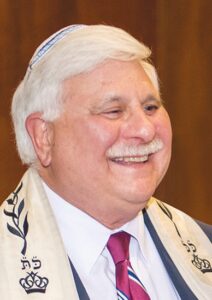When I read a headline a few months ago, a line from Shakespeare’s Hamlet “…to sleep, perhaps to dream…,” popped into my head. The headline asked, “What would you do with 1.7 billion dollars if you won the lottery?” A billion ideas floated through my mind.
My first thought was to invest my winnings in the “Talmud Portfolio,” a strategy that predates modern financial theory by 1500 years. In a Talmudic passage from BT Bava Metia 42a, Rabbi Yitzhak writes: “A person should always divide his money into three; he should invest one-third in land (real estate), one-third in business (stocks and bonds) and keep one-third in his possession (cash).” That allocation has returned 6% percent over the past five years. That is not bad, though taxes would have reduced my investment by millions. Bummer!
Alternatively, I thought about following Tevya’s example from Fiddler on the Roof. In the song “If I Were a Rich Man,” Tevye dreams about building a big, tall house with rooms by the dozen and a stairway going nowhere just for show. I do not need anything that extravagant or ostentatious. I would be happy to have enough to pay for a few trips and for gifting family, friends, Jewish and non-Jewish institutions and charities.
Our Jewish ancestors seemed to have had a love-hate relationship with wealth. On one hand, Jewish lore encourages us to dream big. The rabbis lauded the pleasure riches can bring, and the good they can do. A Yiddish proverb goes, “If money is dirt,” smear some on me.
A passage from the Midrash adds to this sentiment. In Genesis Rabbah 9:7, a commentator, Rabbi Nachman, extolls the positive role of raw ambition in the pursuit of material things. He does so by parsing the phrase, “and behold, it was very good,” which is what God says when evaluating the final day of creation (Genesis 1:31).” Rabbi Nachman, using a twist of rabbinic logic, explains that the word “good” by itself refers to our inclination to do good, but when the word “very” is placed in front of the word “good,” it changes the phrase to mean our inclination to do evil. Yet when asked how our inclination to do evil can be “very good,” the Rabbi responds: “ Were it not for our inclination to do evil, no one would build a house, marry or beget children.” In other words, the desire for gain and competition, which can be viewed as negative, is ultimately positive, because it drives human progress and allows civilization to accumulate more.
Rabbi Hillel disagrees, detailing the unintended consequences of being rich. In Pirke Avot 2:7 he succinctly warns “…the more flesh, the more worms; the more property, the more anxiety.” That image speaks for itself.
Against this backdrop, it is fair to ask if Jewish lore offers a middle ground between the two extremes. A teaching from Pirke Avot 4:1 fills this slot. Rabbi Ben Zoma asks, “who is rich, and responds rhetorically, “He who is content with what he has.”
More than a warning to be careful about what we wish for, the Rabbi’s observation reminds us to appreciate what we already have. And by extension, it admonishes us to stop and contemplate other dangers inherent in flights of fancy, like confusing what we want with what may be good for us, mistaking dreams for reality, or imposing other people’s dreams on ourselves and others.
As for me, I will keep buying my one lottery ticket and dreaming about how much good I could do if I won, because the simple act of dreaming is priceless.



